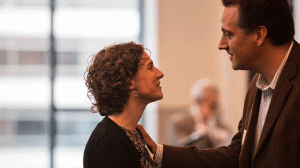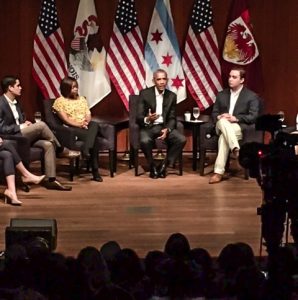 On Monday, April 24th Loyola’s Institute for Pastoral Studies invited me to hear former President Barack Hussein Obama speak at the University of Chicago. It would be his first public appearance and speech post-presidency, and he decided that it would be with young future leaders from different academic institutions. In 2008, I voted for a presidential candidate for the first time. At no point in my teenage years did I think of voting as a way to demonstrate my contribution to a fair and just society for all Americans. Gaining the right to vote seemed a rite of passage of sorts, like seeing an R-rated movie when turning 17; but for me it held no real potentialities of equality for those who were disenfranchised and underserved. I did not know that by the time I was of voting age, I would be invested in the political process until President Obama was on the ballot. One could say the same of anything that does not matter until it does. How one gets to their destination is irrelevant for a child sitting passively in a car, until that child begins to navigate the car. Yet, I never thought voting could benefit me and persons who looked like me until I saw a person running for office who was from my city and had my skin complexion.
On Monday, April 24th Loyola’s Institute for Pastoral Studies invited me to hear former President Barack Hussein Obama speak at the University of Chicago. It would be his first public appearance and speech post-presidency, and he decided that it would be with young future leaders from different academic institutions. In 2008, I voted for a presidential candidate for the first time. At no point in my teenage years did I think of voting as a way to demonstrate my contribution to a fair and just society for all Americans. Gaining the right to vote seemed a rite of passage of sorts, like seeing an R-rated movie when turning 17; but for me it held no real potentialities of equality for those who were disenfranchised and underserved. I did not know that by the time I was of voting age, I would be invested in the political process until President Obama was on the ballot. One could say the same of anything that does not matter until it does. How one gets to their destination is irrelevant for a child sitting passively in a car, until that child begins to navigate the car. Yet, I never thought voting could benefit me and persons who looked like me until I saw a person running for office who was from my city and had my skin complexion.
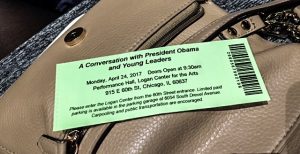
When President Obama won the 2008 election I was in disbelief. Yeah, I voted for him but what were the odds that he would actually win? In 2012, I became hopeful that we could live in a country where all persons mattered because we were employing those in society who typically were marginalized and deemed unfit to be president. However, in the 2016 election I was reminded of this country’s resistance to change. Why this country consistently institutes wealthy older heterosexual white men to lead us baffles me. It’s as if America said “you know what – we are going to elect the richest, oldest and most misogynistic white man to ever run for presidency to fix everything that is wrong with America to ‘make her great again!’” Straight again. Hate again. Keep her led by a man that most cannot stand, but if all else fails at least she represents whiteness and that historically has equated to dominance. Yet somehow – despite this country’s proclivity to tradition – attending the conversation with former President Barack Obama and young future leaders at the University of Chicago reminded me that anything is possible when young people are inspired to go out and change the world.
President Obama decided to speak briefly and allow the panel of youth to do much of the talking. The take away points from his time with us was “not to worry so much about what we want to be, but pursue what we want to do.” If we figure out what we want to do, we will spend our lives pursuing this doing, and maybe along the way we will discover that we are what we wanted to be. Dope!
His last note-worthy point was a reiteration of a point made by a student who said we should “listen to each other to understand versus listening to respond.” He honed in on this point as a lesson for life that he learned the hard way through his years of marriage. Given the fact that the U.S. does not share a common history, and no longer shares commonality in our gathering of news – for better or for worse – it has definitely strained our ability to listen to understand the other. As a black woman, I think listening to respond has always been at play as it concerns my people and our struggles in this country. Currently, my experience of this petition of “listening to understand” is a prevailing discourse in society because the dominant culture is experiencing the sting of oppression in a country that has typically worked for them, and however devastating dominant culture believes this past election was, it came as no surprise to those who have experienced oppression in various forms.
Obama was a reminder that there is good in the world. Not because of his political views, skin color and commitments or lack thereof, but by virtue of who was in the room; to my left an Asian student, to my right a Latina, in front of me a woman wearing a hijab and all the way in the corner an older all-too-giddy white male professor honored to be a part of such a profound opportunity. The point I’m making is that the room was filled with the “other.” We were listening, laughing and understanding despite any and all potential differences. There, in the Logan Center for the Arts Performance Hall we gathered for a common cause… to represent our academic institutions and to have a conversation with President Obama.
written by: Ramona Gant, IPS Student
 The Association of Theological Schools, has awarded the Institute of Pastoral Studies and Dr. Dan Rhodes with an innovative projects grant to aid in a new approach to Contextual Education. This project will form equipped leaders to serve the church and society in the twenty-first century and will pioneer a model of theological education based on the process of action research teams.
The Association of Theological Schools, has awarded the Institute of Pastoral Studies and Dr. Dan Rhodes with an innovative projects grant to aid in a new approach to Contextual Education. This project will form equipped leaders to serve the church and society in the twenty-first century and will pioneer a model of theological education based on the process of action research teams.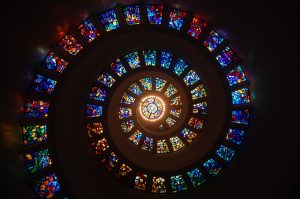
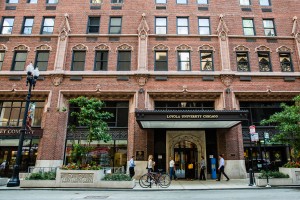 a planning grant as part of Called to Lives of Meaning and Purpose, a new initiative. Dr. Dan Rhodes, IPS Faculty Coordinator of Contextual Education, and Mark Bersano, IPS Coordinator of Continuing Education, will lead the planning process. The grant will fund the planning of an “innovation hub” at Loyola’s IPS, which will seek to help congregations learn more about their calling and purpose within their parish communities.
a planning grant as part of Called to Lives of Meaning and Purpose, a new initiative. Dr. Dan Rhodes, IPS Faculty Coordinator of Contextual Education, and Mark Bersano, IPS Coordinator of Continuing Education, will lead the planning process. The grant will fund the planning of an “innovation hub” at Loyola’s IPS, which will seek to help congregations learn more about their calling and purpose within their parish communities. 

